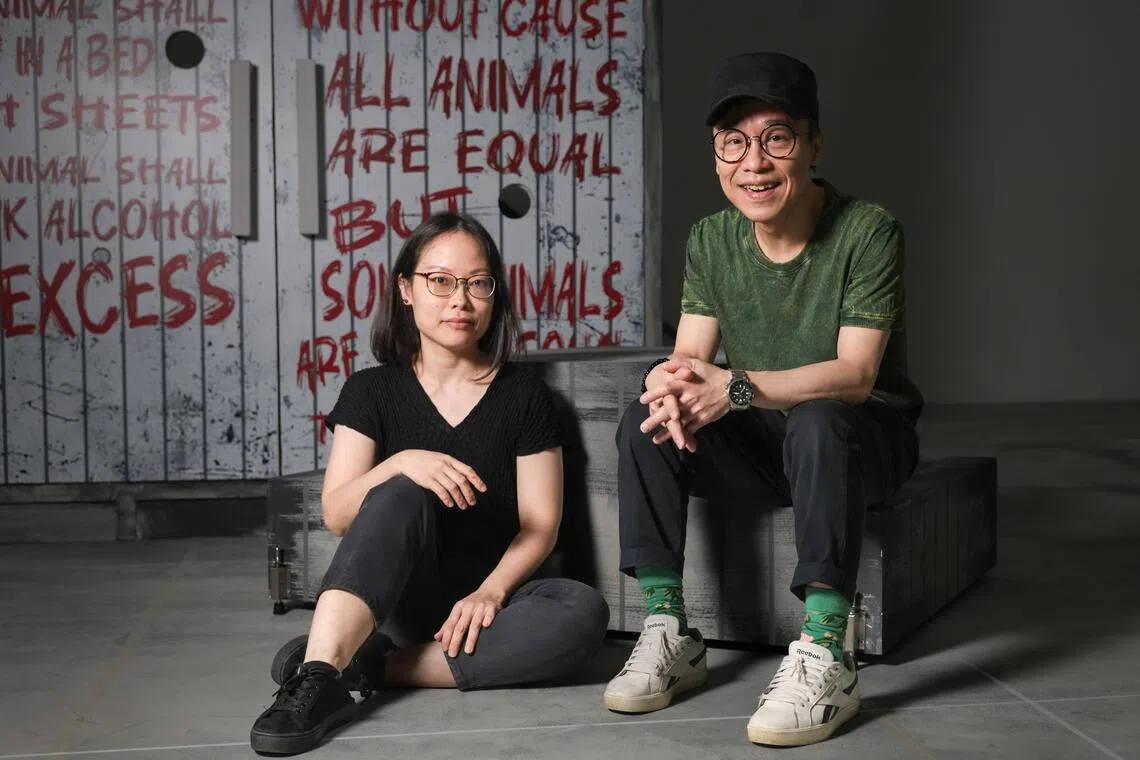The Finger Players scraps artistic director role, adopts collaborative leadership model
Sign up now: Get ST's newsletters delivered to your inbox

The Finger Players' core team members Loo An Ni (left) and Oliver Chong will be creative leads in the research and practice domains from April 2026.
PHOTO: ST FILE
- The Finger Players (TFP) will replace its single artistic director with four creative leads in April 2026.
- TFP faces challenges, including unpredictable audience patterns, and will reduce show output to focus on experimental works and alternative spaces.
- Future plans include a puppetry practice book (2028), expanding young audience engagement and exploring puppetry's therapeutic applications.
AI generated
SINGAPORE – Come April 2026, The Finger Players (TFP) will no longer be led by a single artistic director.
Singapore’s oldest contemporary puppetry theatre group will instead appoint four creative leads from its nine-member core team, in the hope that it will strengthen succession planning in a more challenging theatre environment.
Incumbent artistic director Oliver Chong
General manager Myra Loke, 35, says conversations arose from a quarter-life crisis as TFP celebrated its 25th anniversary in 2024.
The new model will give core team members more opportunities to work on their cultural leadership skills without over-reliance on a single figure.
In 2019, TFP restructured and experimented with a rotational artistic director model, with Loke and Tan as co-artistic directors, but that model has run its course.
Loke adds: “When we were considering what’s next for the rotating artistic directorship, we realised that we don’t have such a person – and we didn’t want to rotate back.”

Core team members Ellison Tan (pictured) and Sindhura Kalidas will be The Finger Players' creative leads in the education and engagement domains from April 2026.
ST PHOTO: GIN TAY
The change comes amid some challenges for TFP. Loke says it is “harder to read audience patterns now”, with their previously sold-out Friday and Saturday night performances now often clocking the slowest ticket sales.
TFP puts on about nine to 12 shows annually, but the company will reduce its output a little to invest more time on process and creating bigger, bolder and more experimental works.
Its annual Puppet Origin Stories will have its final run in 2025
To make puppetry more “palatable for mainstream audiences”, TFP will explore presenting puppetry in unconventional outdoor and digital spaces. It will also explore how puppetry can be applied to other areas, such as developing a curriculum for therapists to use puppetry.
Tan and Kalidas will grow young audience wing The Little Players, with plans to hold an annual show in its main season.
Tan, 36, says educating parents on the importance of young audiences encountering “difficult themes” in theatre is urgent.
Chong and Loo will edit a puppetry practice book, slated for release in end-2028, addressing a gap in writing about puppetry in Singapore and with the aim of engaging the public.

Core team members Ellison Tan and Sindhura Kalidas (pictured, left) will be The Finger Players' creative leads in the education and engagement domains from April 2026.
PHOTO: TUCKYS PHOTOGRAPHY
Reflecting on his stint, Chong, 48, says he has advocated that “puppetry is not only meant for entertainment and for kids”, courting, for example, collaborations with local Vedic metal band Rudra
TFP has been more proactive about experimenting and making its succession plans visible.
Says Loke: “We shouldn’t just hold on to a system because it is set. If we need to change, we should not be afraid to.”


